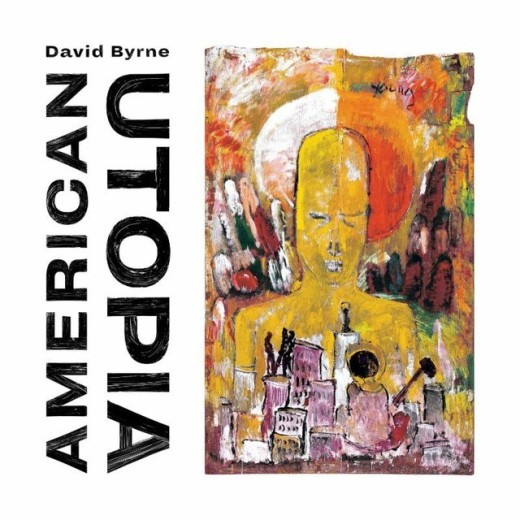David Byrne should be more egomaniacal than he is. Just take a moment and examine his back catalogue. Any human being who can craft records as powerful and diverse as Remain in Light, Fear of Music, and My Life In The Bush of Ghosts has every right to be as pompous as they like. Add to this the fact that he composed what might be the greatest love song ever recorded (‘This Must Be The Place’) and managed to get traditional music from across Africa played on mainstream radio and you simply have to accept it without question. But what’s always been such a delight about Byrne is that he isn’t some kind of Billy Corgan ego monster. He’s an artist who has spent the better part of his career working with others and being very upfront about that fact.
As an example, his last three albums have all been collaborative efforts. Even when he releases something under his own name, the laundry list of other artists who’ve played a part in its creation is as long as your arm. The fact that the auteur theory has never seemed to hold much weight for him is a breath of fresh air and speaks volumes to the core tenet of his philosophy: Togetherness above all else. Everything under his belt has contained some variation on this idea, be it in the open arms with which musicians from all walks are welcome or the words that accompany the music, there has always been a desire for human connection and inclusiveness in Byrne’s work. But where does that spirit of unity fit into our current society? Technology, which on the surface was designed to unite us, has caused us to schism into different tribes, each believing the other to be some kind of harbinger of doom. Our reality is filtered and tailored to keep us using the same forty sites when we literally have the entire world at our fingertips. We are the most well educated, connected group in human history, but many of us would struggle with the most basic of human interactions. With such a dichotomy, how does the artist bridge this gap? American Utopia has a few ideas as to how.
Genre fluidity has been the man’s calling card since Talking Head’s cover of ‘Take Me To The River’. Over the last 40 years, Byrne has dabbled in dance, ambient, punk, afrobeat, baroque pop, folk and so much more. His ability to interpret and manipulate these subcultures hasn’t diminished in that time and the ability to access more with greater ease has only expanded his horizons. The only real guaranteed sound on American Utopia is the distinctive vocals. Every single cut has some kind of musical left turn nestled in it. Take the album opener ‘I Dance Like This’. On the surface, it’s a gentle little piano ballad with these delicate electronic flourishes. It lulls you into this sense of comfort, only to pull the rug out from under you in the chorus. At this point is slams ominous industrial beats that conjure memories of the instrumental passages of Nine Inch Nails’ The Fragile to the fore. Just as you’ve got a handle on the situation, it jackknifes back into its lilting piano warbling. Beginning the LP with this song was a real stroke of genius as it firmly implants the central motif of the album in your head: things will happen, just go with them and you’ll be rewarded many times over.
‘Everyday Is A Miracle’ is a delightful slice of Afro-Caribbean soul that gives way to the expansive pop of ‘Dog’s Mind’, which builds to one of the most satisfyingly epic conclusions on the whole record. Given that genre is in a constant state of flux, mood and atmosphere are free to float wherever they please. ‘Doing The Right Thing’ has a beautiful, celebratory house inspired crescendo that sits comfortably alongside the ominous psycho-funk of ‘Everybody’s Coming To My House’ and ‘It’s Not Dark Up Here’.
There’s such a maniac energy here that it’s very difficult not to get completely swept up in the flurry. But wisely, Byrne knows when to slow things down and let the album breath. He does this most effectively on the closing number, ‘Here’, the strongest piece on the whole album. It’s got pretty much everything that the LP has delivered musically but in a more succinct package. The electronic production, intricate drums and melody characterised by gentle a string section, synthesizers and guitar flourishes build to a muted, but satisfying, climax. It’s one of the more spacious songs here and that allows each of the individual elements to wash over you. This is so important because if you look at the collaborator list for this release which includes the likes of Eno and Daniel Lopatin, you really want to be able to hear what they’re bringing to the table. In the weaker moments of the collection, what they’re doing is lost and that’s a real shame as often times what these people bring with them is the garnish that makes Byrne’s work so rich. It does, however, bear noting that of the 25 collaborators featured on this album, not a single one of them is female. An uncharacteristically foresight-less issue, Byrne has since responded to criticism of the matter, saying, “I never thought of myself as ‘one of those guys’ but I guess to some extent I am. Your responses serve as a corrective.”
Moving on, while sonically American Utopia jumps from place to place and tone to tone with a reckless abandon, lyrically, things are more pointed. The album was sprung out of his ‘Reasons To Be Cheerful’ multimedia project, which, as the name suggests, was designed to inspire a sense of optimism. While in the past, many have noted the sarcastic qualities of Byrne’s words, there’s always been a sincere, human undercurrent to them. ‘Once In A Lifetime’ is a song about having a midlife crisis, but one where we’re meant to identify with that fear.‘Air’ is a distressing song about depression masquerading as a slice of irony. A deeply human affection drives everything he has done and the same is true for American Utopia.
This record is an attempt to unravel the hyper-object of contemporary society and make sense of it some degree. For this to work, he finds joy in the mundane but also delves deep into the darkness. ‘Bullet’ tracks the path of a bullet as it passes through a human body and pierces all the different parts of the world that life has touched, while ‘Dog’s Mind’ attempts to find some comfort in the insanity of the modern world through the perspective of a canine. The ambition is lofty and well-intentioned, but unfortunately, the execution leaves something be desired.
While there are pieces, like the aforementioned ‘Here’, which do work exceedingly well on a poetic level, there are some ropier examples present too. The most egregious of these, and arguably the one that’s most reflective of the album overall, is ‘Every Day Is A Miracle’. On this cut, Byrne tries to tackles the insignificance of man and our societal structures in the face of the expansiveness of nature. The issue is though, is that his odd metaphors – while they do add some extra impact to the theme – are mostly goofy. You’ve got nuggets like “The Pope don’t mean shit to a dog” and “Now the chicken imagines a heaven/Full of roosters and plenty of corn/And God is a very old rooster/And eggs are like Jesus, his son” which are just bizarre to the point of ludicrousness and are ultimately detrimental to the weight of the message.
Those moments are less Jackson Pollock and more preschool painting. To have the album fall down so hard on this level is a real disappointment. It stops American Utopia from becoming the transcendent piece it has the ability to be. But like everything else pop’s most eccentric figure has released, it is definitely worth a listen. The colours and shapes he conjures with his vast array of influences make this, on it’s worst day, a properly intriguing listen. There’s a comfort in knowing that a man of such quirk and charm can still make something so beguiling and joyous this far into the game. Will Murphy





